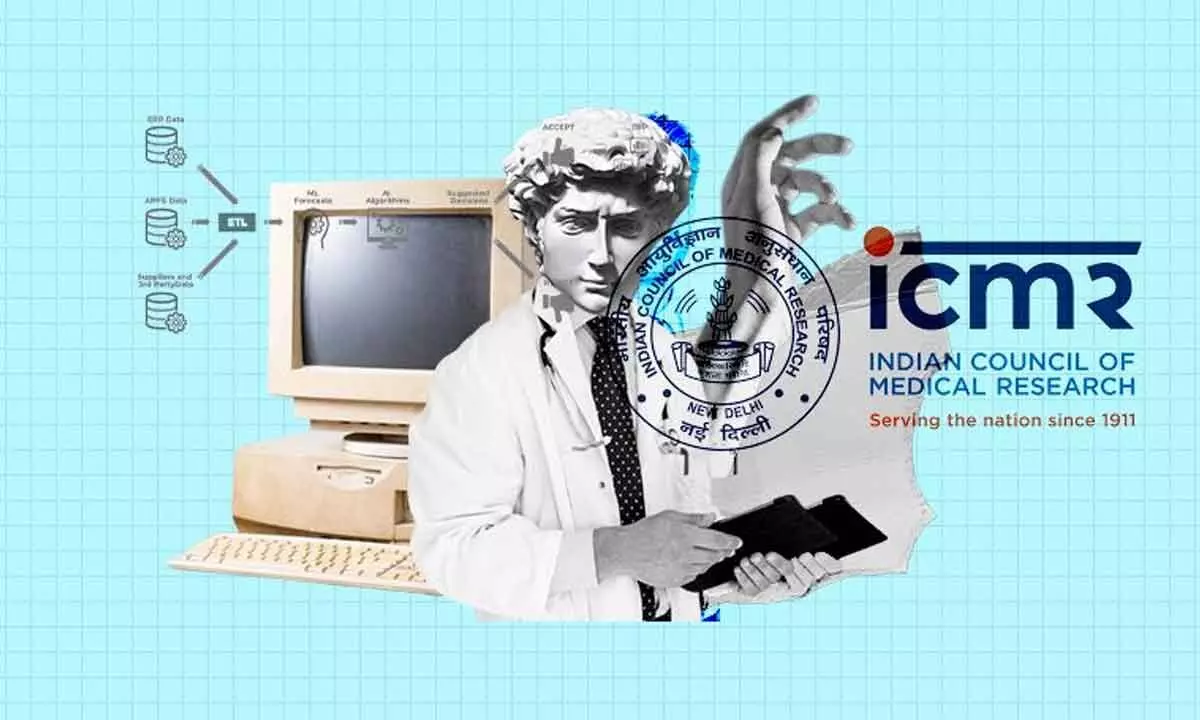New guidelines for ethical AI tech applications in healthcare laudable
Like with other sectors, AI is bringing in qualitative healthcare
image for illustrative purpose

AI has made inroads into every sector and healthcare is no exception. Recognising this, the ICMR released ‘Ethical Guidelines for AI in Healthcare and Biomedical Research’ to guide effective yet safe development, deployment and adoption of AI-based technologies. No doubt, AI is one of the most promising technologies in the coming decade and healthcare sector is the one to benefit the most by integrating with AI
In a move which will have far reaching implications of Artificial Intelligence (AI)-based technologies in healthcare, the Indian Council of Medical Research (ICMR) has recently released ‘Ethical Guidelines for Application of Artificial Intelligence in Biomedical Research and Healthcare’.
These guidelines will provide the ethical framework for development of AI-based tools, which will benefit all stakeholders, including innovators, developers, patients, technologists, researchers, healthcare professionals, ethics committees (ECs), sponsors and funding agencies involved in research related to AI in biomedical research and healthcare.
It will establish an ethical framework that will aid in the creation, implementation, and acceptance of AI-based solutions in biomedical research and healthcare delivery. Of course, AI has made inroads into every sector and healthcare is no exception. Recognising this, the ICMR released ‘Ethical Guidelines for AI in Healthcare and Biomedical Research’ to guide effective yet safe development, deployment and adoption of AI-based technologies.
No doubt, AI is one of the most promising technologies in the coming decade and healthcare sector is the one to benefit the most by integrating with AI. The induction of AI into healthcare has the potential to be the solution for significant challenges faced in the field of healthcare like diagnosis and screening, therapeutics, preventive treatments, clinical decision making, public health surveillance, complex data analysis, and predicting disease outcomes. This list is likely to grow continuously in future.
Medical AI has enormous potential to overcome some of the major challenges in healthcare, such as lack of medical professionals and infrastructure, rising healthcare costs, and difficulties in the implementation of new technology due to the complex healthcare system. Undoubtedly, the adoption of AI technology in healthcare is growing in India. . The field of AI is rapidly expanding and has made significant inroads in almost all aspects of human life, including healthcare.
The incorporation of AI-based tools and techniques is expected to improve healthcare delivery by making healthcare accessible and affordable and improving the quality of care provided. As a result, AI for health has been recognized as one of the core areas by researchers as well as the governments.
However, AI as data-driven technology has many potential ethical challenges, which include algorithmic transparency, clarity on liability, accountability and oversight, bias and discrimination. So, an ethically sound policy framework was essential to guide the AI technologies development and its application in healthcare.
It is to address this specific need that ICMR, the apex body for conduct of biomedical research in the country, has come up with ethical guidelines for research and help in identifying and negotiating emerging ethical challenges and concerns.
Similar to the basic field, ethics for AI is also a rapidly evolving area and therefore the document is a live document and will be updated as and when the need arises. Both healthcare and AI technologies are rapidly advancing and so shall the associated ethical dimensions.
The purpose of these guidelines is not to limit innovation or recommend any disease-specific diagnostic or therapeutic approach but to guide effective yet safe development, deployment and adoption of AI based technologies in biomedical research and healthcare delivery.
In 2019, Central Drugs Standard Control Organization (CDSCO) also brought out guidelines for evaluation of new drugs and conduct clinical trials. India has given these guidelines legal status under the new drugs and clinical trials rules.
In developing AI technology for application in healthcare, broadly the same ethical principles can be followed. However, since AI technology has several unique methodological and interpretation challenges and in the context of a rapidly evolving healthcare scenario, the guidelines have been formulated in consultation with experts from these two fields. The document includes separate sections addressing ethical principles for AI in health, principles for stakeholders, ethics review process, governance of AI use for healthcare and research, and informed consent process involving human participants and their data.
The guidelines were formulated after extensive discussions with subject experts, researchers and ethicists.
(The author is freelance journalist with varied experience in different fields)

